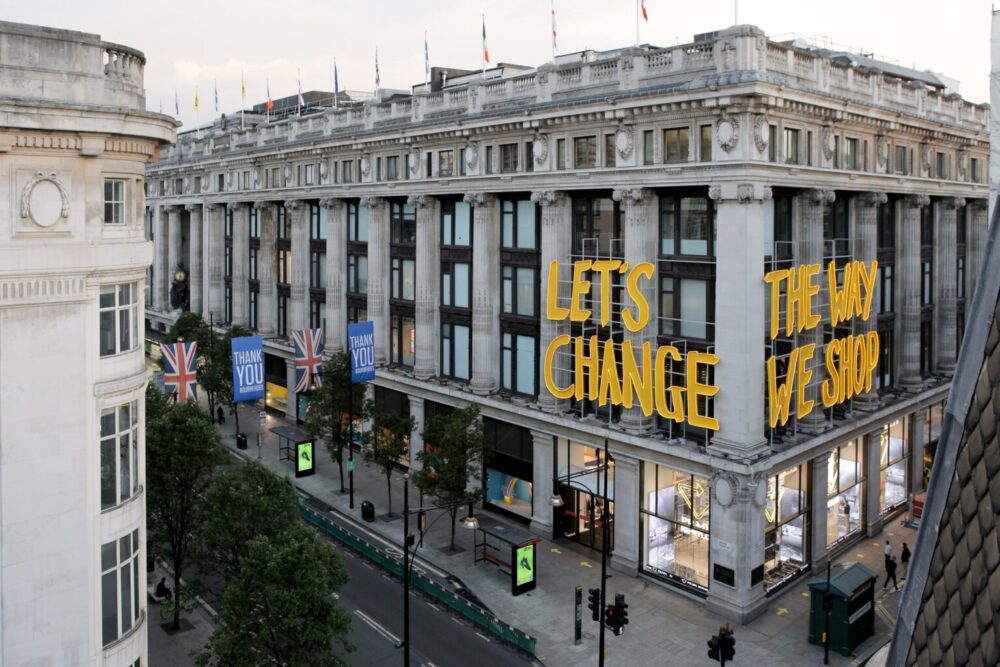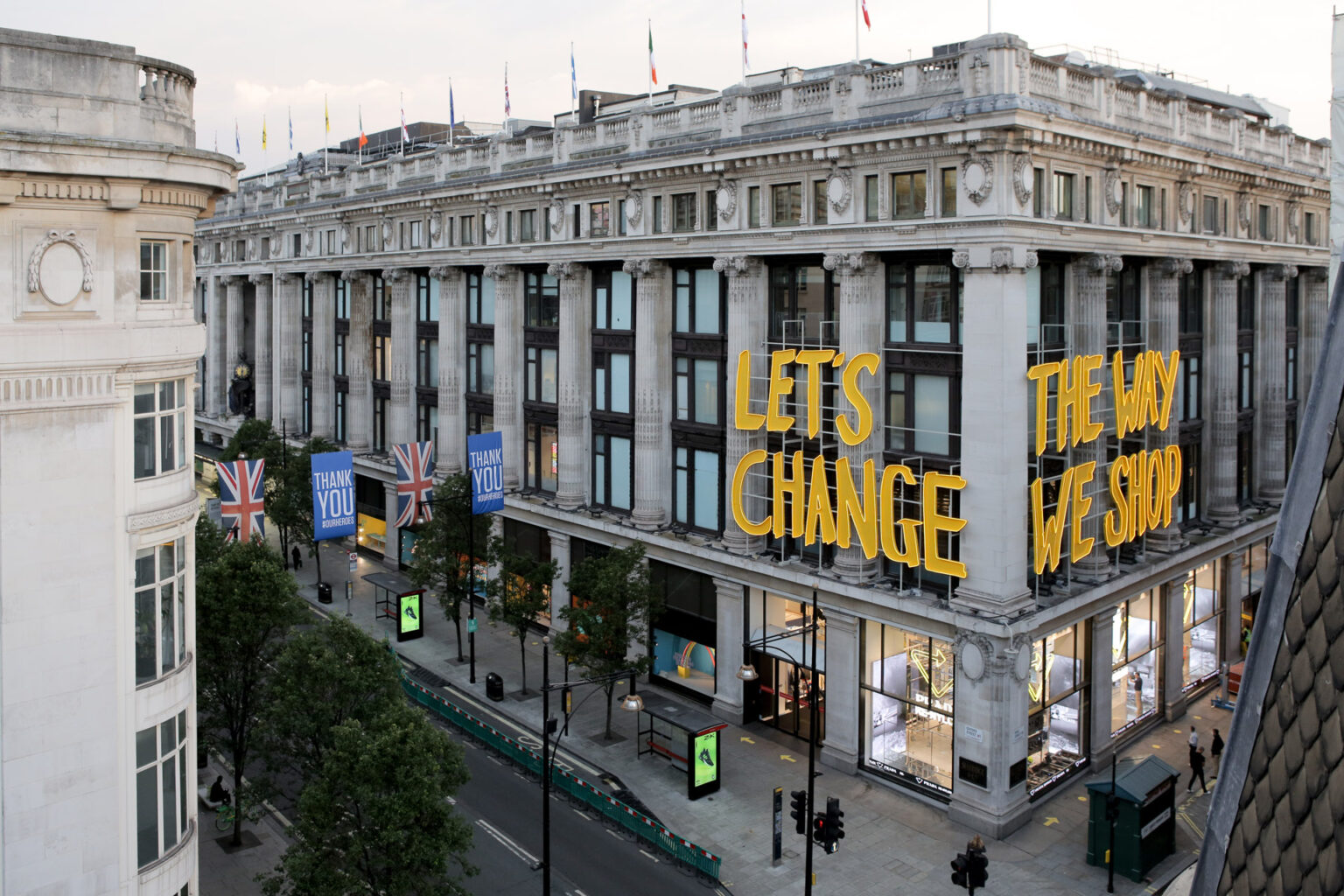You only need to take a walk down Oxford Street at the moment to see that things are changing. And no, we’re not talking about the smaller crowds and the common sight of face masks.
It’s those big letters plastered across London’s Selfridges store that have captured our attention.

PHOTO MATT WRITTLE/SELFRIDGES
© copyright Matt Writtle 2020.
The display, which reads “Let’s change the way we shop”, is one of the most recent in a trend that is on course to disrupt the luxury fashion market for the better, predicts Robert Lockyer, CEO and founder of Delta Global, a provider of innovative and sustainable packaging solutions for high-end retailers.
“As an increasing number of retailers and consumers awaken to the realities of fashion’s damaging environmental impact, which I believe the pandemic has only accelerated, resale will become the preferred way to provide a genuine circular-luxury economy.”
In the case of Selfridges, sustainability initiatives are nothing new. A long list of efforts includes a partnership with Vestiaire Collective, whereby the online resale platform opened its first bricks and mortar concession counter in the department store, and a collaboration with HURR Collective, a designer clothing and accessories rental service.
The latest activity added to Selfridges’ Project Earth program, the business’ commitment to taking radical action in response to the climate crises, is Reselfridges – a move that will see the luxury brand itself become a key player in the pre-loved and vintage designer fashion market.
While from launch the service allows luxury fashion followers to buy second-hand clothing and accessories from expert vendors, plans to roll out a selling function for consumers are also in the pipeline.
But Selfridges isn’t alone. In recent weeks, we’ve heard similar plans from Gucci, who has partnered with The RealReal, Levi’s and H&M’s COS label, too.
Robert attributes the trend to shifting consumer behaviours.
Pandemic patterns
The resale market is predicted to grow from $7 billion this year to $36 billion by 2024. A prediction that goes against the grain when compared to other markets hit by the coronavirus pandemic.
“The pandemic has caused a number of shifts in consumer sentiments and habits. Greater awareness of environmental impact is one of these, and also one which will be a driving factor in the growth of the resale market,” explains Robert.
“Having lived a more minimal life for many months now, consumers’ eyes have opened wider to the effects their usual habits have on the environment. Whether that is daily commutes, their consumption patterns or the way they dispose of waste, attitudes have changed.”
Another pattern emerging from the pandemic is a shift in consumer spending.
“It comes as no surprise that consumers will have tighter budgets for the foreseeable future due to the virus’ economic impact and, as a result, businesses need to adapt their offerings,” he urges.
“In luxury, there needs to be a greater focus on value for money. That could be in the quality of products or the additional benefits they offer, for example.
“Packaging is the perfect place to add value to products. While eco-friendly materials are a given for ethical consumption, investment in their quality will ensure boxes and bags are durable, long-lasting and reusable too.
“And, in terms of resale, retailers can encourage more of a circular economy with packaging that reinforces the value of the items inside. While sellers receive a better-than-expected return, those purchasing a second-hand item still get the authentic experience of unboxing a high-end purchase. It might not be brand new but it feels new to them. And that’s good enough.”
That’s last season, so?
For most luxury brands, fashion week calendars and seasonal collections have faced unprecedented challenges. While some hang on to the threads of what was the industry’s regular scheduled programming, others debate whether the model is, in fact, something that needs to be held on to.
Up in the air at the moment is the need for frequent new collections, pre-season catwalks and store deliveries that predict consumer trends. And, following a joint statement by the Council of Fashion Designers (CFDA) and the British Fashion Council (BFC) which outlined these issues, many brands have already taken action.
Robert believes this is another reason for the rise of resale.
“There’s less pressure to keep up with constantly evolving trends. In fact, old is what’s in style and resale offers just that.
“For consumers, then, this means holding on to items for longer and, knowing they will get greater use out of them, they may even opt to spend more on luxury ones. This is a proposition which becomes even more attractive, when they know they can resell them later on down the line, too.”
“In terms of actual trends, there is a lack of things that are truly new, so brands are forced to look elsewhere for innovation. Whether this is in the sustainable materials they choose to use, added value in their packaging or reinvented business models, what’s inevitable is a change in the way we shop.”
So, are Selfridges really on to something?
Robert thinks so: “Change requires a collective effort. It’s bigger than a single retailer or group of consumers.
“Fashion is at a breaking point when it comes to climate change and both brands and consumers need to act fast if they are to contribute to addressing the crisis before irreversible damage is caused.
“And brands realising that they have the customers, platforms and logistical resources not only to support a circular economy but to create one is encouraging to see.”














